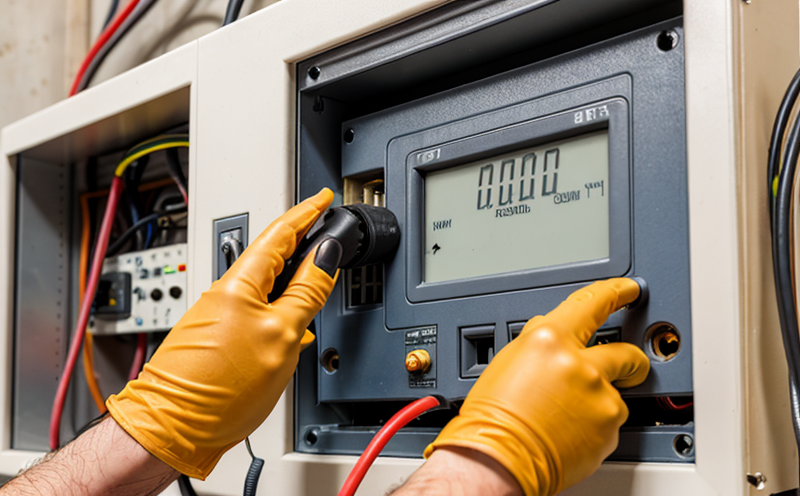UNE EN 62660 Electrical Testing of Lithium-Ion Cells in EV Applications
The UNE EN 62660 standard is a pivotal document that specifies the electrical testing procedures for lithium-ion cells used in electric vehicle (EV) applications. This regulation ensures that the cells are safe, reliable, and perform optimally under various operating conditions, thereby enhancing the overall performance and safety of EVs.
The scope of UNE EN 62660 covers all aspects related to electrical testing, including voltage measurement, capacity determination, internal resistance evaluation, and other critical parameters. It is designed to be applicable to lithium-ion cells intended for use in electric vehicles, such as traction batteries, backup power systems, and energy storage solutions.
The standard mandates rigorous testing protocols that are essential for ensuring the safety and performance of EV components. Compliance with UNE EN 62660 not only facilitates market access but also enhances brand reputation by demonstrating a commitment to quality and safety standards.
For those involved in the design, manufacturing, or procurement of lithium-ion cells for electric vehicles, understanding this standard is crucial. It provides detailed guidelines on how to conduct these tests accurately and consistently across different stages of production and use.
The testing procedures outlined in UNE EN 62660 are designed to simulate real-world conditions that the cells might encounter during their operational life cycle. This includes high-temperature cycling, low-temperature storage, full charge-discharge cycles, and more. These tests help identify any potential weaknesses or issues early on, allowing manufacturers to address them before the products reach the market.
The standard also emphasizes the importance of accurate measurement techniques and instrumentation selection. Proper equipment calibration is critical for obtaining reliable results. Manufacturers must ensure that they have access to high-precision instruments capable of withstanding harsh environments often found in EV applications.
Compliance with UNE EN 62660 ensures not only regulatory compliance but also enhances the trustworthiness and reliability of the products being produced. This is particularly important given the increasing focus on electric vehicles as part of global efforts towards reducing carbon emissions.
Why It Matters
The importance of UNE EN 62660 cannot be overstated in today’s rapidly evolving automotive industry where sustainability and safety are paramount. By adhering to this standard, manufacturers can ensure that their lithium-ion cells meet stringent electrical performance criteria.
- Enhanced Safety: Ensures the safe operation of EVs by identifying potential hazards early.
- Better Performance: Provides insights into how well the cells will perform under various conditions throughout their lifecycle.
- Market Access: Facilitates compliance with international regulations, opening up opportunities for global markets.
- Brand Reputation: Demonstrates a commitment to quality and safety standards, enhancing brand reputation among consumers and stakeholders alike.
The benefits extend beyond just the manufacturer; they also impact end-users by providing them with safer and more reliable EVs. Ultimately, compliance with UNE EN 62660 contributes significantly to advancing the technology behind electric vehicles while ensuring consumer confidence in these innovations.
International Acceptance and Recognition
The acceptance of UNE EN 62660 is widespread across multiple countries due to its rigorous requirements and emphasis on safety. Countries like Germany, France, the United Kingdom, China, Japan, and others have adopted this standard as part of their national regulations for electric vehicles.
UNE EN 62660 has gained recognition not only from governments but also from international organizations such as the United Nations Economic Commission for Europe (UNECE) and the International Organization for Standardization (ISO). These bodies endorse the use of UNE EN 62660 because it provides a harmonized approach to testing lithium-ion cells, promoting consistency across borders.
The widespread adoption of this standard underscores its significance in ensuring high standards of safety and performance. As more countries embrace electric vehicles as part of their green initiatives, adherence to UNE EN 62660 becomes increasingly important for manufacturers who wish to participate fully in these markets.
Use Cases and Application Examples
| Use Case/Application | Description |
|---|---|
| Traction Battery Testing | Testing lithium-ion cells used in the main propulsion system of electric vehicles. |
| Energy Storage Systems (ESS) | Ensuring reliability and safety of ESS for stationary applications like grid stabilization or backup power supply. |
| Backup Power Solutions | Testing cells used in emergency power systems to ensure they can deliver reliable power during outages. |
| Prototype Evaluation | Evaluating prototype lithium-ion cells before mass production, helping identify any design flaws or performance issues early on. |
- High-temperature cycling: Simulates conditions encountered in hot climates or during long trips with heavy loads.
- Low-temperature storage: Ensures the cells remain functional even when exposed to cold temperatures for extended periods.
- Full charge-discharge cycles: Tests how many times the cell can be fully charged and discharged before its capacity significantly decreases.
The results from these tests provide valuable data that helps manufacturers improve their product designs, extend battery life, and enhance overall vehicle performance. This information is crucial for both R&D teams working on new technologies as well as quality assurance departments responsible for maintaining consistent standards across all products.





